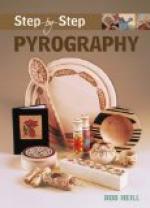Giovanni was left alone. On the morrow he took his departure for Saxony and did his errand. The Duke of Saxony remained at home, and Barbarossa went on without his aid to meet defeat at Legnano. Giovanni met Stefano by chance in Venice when the Emperor went there to sign the peace treaty.
“His armies were doomed from the first,” the jester said in his hoarse guttural sing-song. “They were weighted with the souls of the martyred hostages of Crema. I have lived to see that siege avenged,—and now I must go on livin—and never see Milan again.”
Marveling much at the heights and depths in the soul of a traitor Giovanni went on his way to England. There he discussed with Tomaso the Paduan physician, Ranulph the troubadour and Brother Basil of the Irish Benedictines the astonishing destruction of the Emperor’s army. But he said no word of Stefano.
“It is all in the formula on which his power was based,” said the alchemist thoughtfully. “No man—be he duke, prince or kaiser—can pose as the master of humanity. Men are not puppets; they are free souls in a free world. You cannot make even a puppet-player move contrary to its nature.”
“That is true,” said Giovanni. “And I have never had two that behaved exactly alike. Fantoccini have their own ways of acting—and when you pull the strings yourself, you know.”
THE ABBOT’S LESSON
There were twelve good monks and an Abbot who
came
To found the Abbey and give the name
In the early days when the stones were laid,
And each of them knew a craft or a trade.
Sebastian the shepherd and Peter the smith,
James who made leather, and sandals therewith,
Hilarius the cook, of great skill in his art,
Anselm whose herbal lay close to his heart,
Gildas the fisherman, Paul of the plough,
Arnold who looked to the bins and the mow,
Matthew the vintner and Mark the librarian,
Clement the joiner and John apiarian,
Each wise in his calling as craftsmen are made,—
And each deep in love with his own special trade.
But the Abbot was canny, and never would raise
One above other by blame or by praise.
Now the angel who guarded the Eden gate
Had pity in thinking on Adam’s fate,
And sent him three servants, for earth, air
and sea,
The sheep, and the fish, and the wise little
bee.
And thus it has happened that some people know
More than the rest of us here below.
There was jealousy, bitterness, wrath and fear
Among these reverend brethren here,
With their leather and parchment and metal and
stone,
And the seeds of dissension were freely sown—
Only Sebastian, Gildas and John
In their work appointed went placidly on.
The Abbot considered his turbulent flock,
And he saw the wicked beginning to mock,
And he gathered the craftsmen about him, to
see
Why there was peace with the other three.




